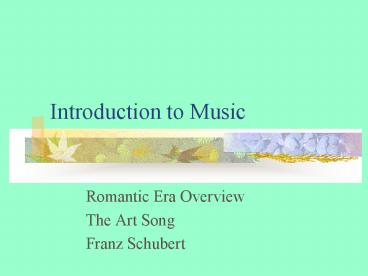Introduction to Music - PowerPoint PPT Presentation
1 / 17
Title: Introduction to Music
1
Introduction to Music
- Romantic Era Overview
- The Art Song
- Franz Schubert
2
Romantic Era Schedule
- Wed, Thurs Mar 18, 19 Ch. 1, 2, 3, 4
- Mon, Tues Mar 23, 24 Ch. 6, 7, 10, 12, 13
- Wed, Thurs Mar 25, 26 Exam 3Classical Era
- Mon, Tues Mar 30, 31 Ch. 17, 18
- Wed, Thurs Apr 1, 2 NO CLASS--Ch 12, 13
preparation
3
Graphics have been removed.
4
19thC Romanticism--an overview
- 1. Revolutionary spirit--dissatisfaction w/
Classical eras restraints - 2. Industrialization
- larger, wealthier middle class pursuing
recreation - middle class music-making
university training in music - explosive urban growth wretched
living conditions - 3. Nature
- Culture preoccupied w/
- Dual view serene, beautiful, alluring
- awesome, foreboding, dangerous
- Interest in nature is reflected in art. Why?
5
19thC Romanticism--an overview
- 4. Artists, musicians, writers drawn to fantasy
world fascination with - the past (esp. middle ages)
- grotesque, ugly, evil
- Might this have provided an escape from harsh
living conditions?
6
Some 19C writers and their fantasy-world works
- Mary Shelley
- Frankenstein
- Sir Walter Scott
- Ivanhoe
- Lewis Carroll
- Alice in Wonderland
- Victor Hugo
- The Hunchback of Notre Dame
- Mark Twain
- A Connecticut Yankee in King Arthurs Court
7
19thC Romanticism--an overview
- Age of
- emotionalism
- grandiose, monumental (Eiffel Tower, Crystal
Palace, etc.) - miniature (short story, tiny art works)
Check out the Crystal Palace at
http//www.victorianstation.com/palace.html
Talk about fascination with miniaturization! Go
to http//www.victorianstation.com/dollent.html G
ranted, Queen Marys dollhouse was made after the
Victorian age had passed, but it is in that same
spirit and mindset!
The entirely glass and iron Crystal Palace could
have held 18(!) football fields.
http//www.victorianstation.com/timelineframe.htm
8
The 19thC Music Business
- 1. Patronage gone
- Beethoven--some contributors, but NO patrons
- Schubertentirely in free market
- 2. Music journalism big business
- 3. Musical celebrities, stars, tour Europe,
entertain middle class audiences. - What is the connection with journalism?
- 4. Th/f much music is extremely difficult--for
virtuosos - 5. Piano most popular instrument (Every home
has a piano!) - 6. Instrumental music predominates
9
19thC Music
- 1. Primary function of music Evocation of
powerful EMOTION - Message more important than form
- Th/f forms looser formal grammar, i.e., forms
are not as clear and precise as in classical era - 2. Individualism VIMP
- Th/f composers develop unique styles
- 3. Program music popular
- 4. Nationalism-- music with an ethnic flavor
- How might a composer achieve this?
- 5. Exoticism--interest in the unknown, foreign,
wild
10
Composers their exotic works
- Dvorak (Czech)
- New World Symphony (native American themes,
melodies) - Rimsky-Korsakov (Russian)
- Scheherazade (Arabian) or Capriccio Espagnol
(Spanish) - Bizet (French)
- Carmen (set in Spain)
- Verdi (Italian)
- Aida (middle East)
- Puccini (Italian)
- La Bohème (set in Paris)
- Madame Butterfly (set in Japan, American sailor,
Japanese woman)
11
For a GREAT and user-friendly overview of the
Romantic, aka Victorian era, including,
architecture, music, literature, science,
inventions, etc.GO TO
- Www.victorianstation.com
Take the time to explore this site I think you
will be fascinated.
12
Art Song (German Lied)
- OLD, but V Popular in Romantic era
- Pop music
- Voice piano
- Excellent poetry!
- Much variety poetry subjects music styles
- Song cycle a set of art songs that function
like chapters in a book.
13
Schubert
- Post-patronage.
- S sold his songs.
- S avoided nobility.
- Best known for art songs 600!
- Schubert melody
14
Log
- Schubert
- Erlkönig
- German Lied
- I poetry by Goethe (the best)
- intensely emotional plot
- through-composed
- singer projects four persons
- CD3, Track 12
15
Erlkönig
- singer projects four persons their voices
- narrator--begins tale
- father--lower pitch, darker tone color, soothing
tone melody - child--higher pitch that becomes increasingly
higher with fright - Erkönig--alluring, beguiling, sinister
CD3,Tk 12
16
The Trout
- most popular art song
- so popular, Schubert was asked to write
instrumental piece on melody
17
The Erlking and The TroutRomantic traits
- Simplicity
- Innocence
- Gentleness
- Goodness
- Complexity
- Treachery
- Brutality
- Evil
COEXIST
1.
2. Contradicting emotions moods 3. Irony
The very definitions of art and beauty are
challenged!































